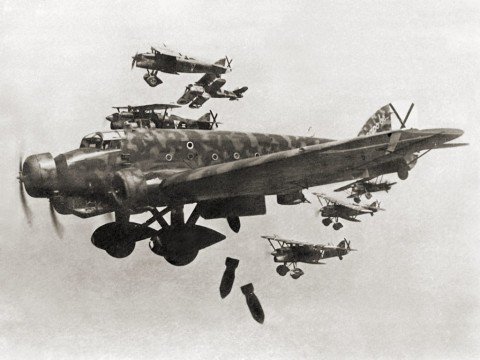This is odd:
To my readers, then, let me explain again that a pursuit plane should not carry out any pursuing. It should be a machine designed for fighting. It should have the qualities of fast climb, reasonable manœuvrability and gun-power. It should be simple in design and cheap to produce, because it will take the actual brunt of all air fighting. Its top speed means absolutely nothing, for unless it can get into the sky quickly -- and often -- and engage the enemy and prevent him from carrying out his mission, you might as well place it alongside Lindbergh's We in the Smithsonian Institute, or with the model of the original Wright biplane in the South Kensington Museum.
OK, so the history of American aviation is not really my area, but surely Lindbergh's plane was the Spirit of St. Louis, not the We? It's probably the most famous individual aircraft in history -- though that does not necessarily mean it was the most famous in 1940 -- and its flight across the Atlantic in 1927 was still well within living memory. How could an aviation writer get the name wrong?
The writer in question was probably better known as Arch Whitehouse, and better known in the US, where he lived, than in Britain, the land of his birth. He was a prolific writer of pulp air adventure stories, as well as popular histories and accounts of the Great War in the air and the exploits of various devil-may-care flying fools, who continued to write into the 1970s. This is quite impressive, as he was born in 1895 and was actually a veteran of the Royal Flying Corps -- first as an observer-gunner, then as a pilot. Whitehouse's bio in Hell in Helmets coyly notes that 'Certain semi-official sources' credited him with shooting down 16 German aeroplanes. Maybe this shows that his memory wasn't particularly reliable, as at most he may have had 4 kills. More likely, it seems that he was something of a serial exaggerator.
Even so, it's hard to think of a motive for intentionally calling Lindbergh's plane by the wrong name (although he clearly had little time for the Lone Eagle, at least in his role as an instant military aviation expert); it's such a trivial error. Aside from the possibility that my copy is actually from a parallel universe (I did acquire it through inter-library loan, so anything's possible), I can only think that Whitehouse (and his editor) had a momentary lapse of reason and confused the plane Lindbergh made his transatlantic flight in with the book Lindbergh wrote about that flight, which was published in 1927 and was in fact entitled "We". That's the obvious connection between "Lindbergh" and "We", and I suppose we all make mistakes from time to time. But for somebody whose entire career revolved around aviation to make such an elementary mistake about his subject would be like a physicist confusing a neutron with a proton.
It's not particularly important, and I already know to take Arch with a grain of salt anyway. It's just like I said ... odd!


